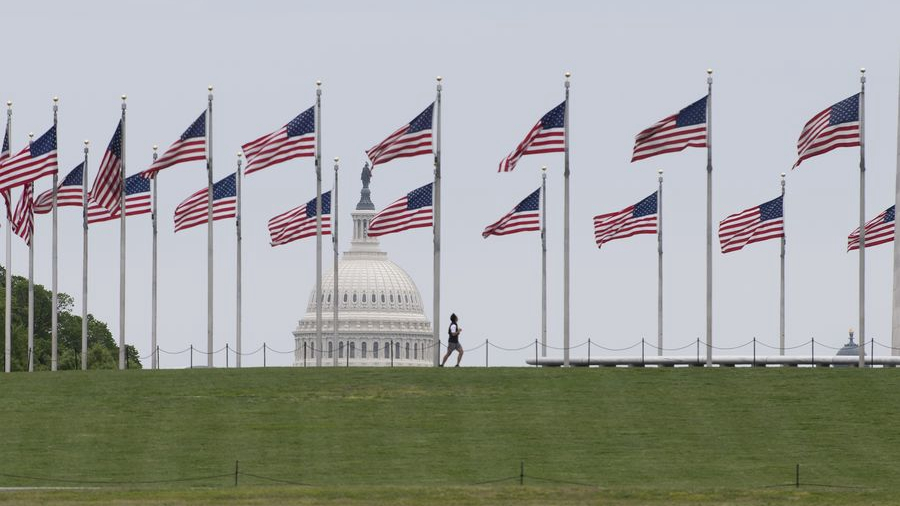Why Washington cautioning the Gulf lacks merit or credibility
By Hamzah Rifaat Hussain | CGTN | Updated: 2020-05-11 10:59

In yet another move towards discrediting Beijing, David Schenker, US Assistant Secretary of State for Near Eastern Affairs, claimed that Gulf States should consider their relationship with the United States while dealing with Beijing.
This statement comes in the aftermath of Beijing's efforts to expand its diplomatic reach towards the Middle East and underlines how hollow pressure tactics in a restive region continues to be a favorite takeaway for the Trump administration as cases continue to rise domestically in the United States. In the oil rich gulf, the Trump administration continues to peddle geopolitics to discredit Chinese influence on Arab states to maintain its hegemony.
Schenker's statement coincides with a whole string of policies which blatantly discard peace and reconciliation initiatives to tackle COVID-19 in the Middle East while also fomenting further tensions in the volatile region.
Gulf states aside, earlier attempts to isolate Iran by keeping sanctions intact and the criminal silence over Israel's policies in the poverty stricken Palestinian territories amid the presence of COVID-19 indicates that American interests will continue to trump humanitarian concerns in the region.
By viewing the Middle East as its key cog and displaying blatant disregard for political powers which oppose American interests such as Syria, efforts are now being made to ensure that regional powers such as Saudi Arabia, the UAE and Qatar do not tilt towards China which is a strategy bound to backfire due to a number of reasons.
Firstly, Gulf States such as Saudi Arabia who had been rocked by declining oil prices globally, have been struggling to cope with the spread of the virus on their shores as their economies sank. Yet, instead of distancing themselves from Beijing over the economic impact of the pandemic, many sovereign heads of state have praised China for its successful handling of the virus by citing the implementation of strict quarantine measures in Wuhan.
Such praise however, is not limited to Arab states alone. Some of Washington's staunchest allies in the region such as Israel have signed deals with Beijing on COVID-19 testing kits, allowing Israel to conduct regular testing for increased transparency and verification of suspects. Such approaches clearly demonstrate that China's diplomacy, unlike the United States, has centered on forging ties in the absence of getting enmeshed in decades old geopolitical fractures in the region such as the Israeli/Palestinian dispute.
Yet what has irked Washington DC the most is that its traditional allies such as Saudi Arabia have become increasingly receptive towards China. Much of the cooperation centering on dealing with COVID-19 between Arab states and Beijing has been both bilateral and humanitarian in nature as was the case when Qatar sent multiple relief flights to Wuhan.
Similarly, Sheikh Abdullah bin Zayed bin Sultan Al Nahyan, United Arab Emirates Minister of Foreign Affairs and International Cooperation, also praised China as a "role model" for spreading optimism in the global fight against the virus. Such cooperation and goodwill has a historical precedent given that prior to COVID-19, China had issued a white paper in 2016 with various Arab states in which healthcare, exchanges in traditional and modern medicine as well as information sharing of epidemics were mentioned.
The more recent developments with the Gulf States, however, have materialized in times when the United States has failed to provide any meaningful form of public health assistance overseas, let alone to its allies in the Middle East.
Overall, the Western response to the pandemic has been controversial from the outset and cannot be confined to the Trump administration's "America First" policy alone. The EU's initial response to the presence of COVID-19 in Italy for example, was marked by export bans by its members and internal political wrangling prior to a workable solution taking place.
Contrastingly, China's adoption of a non-partisan approach in the Middle East has continued to receive positive coverage in capitals such as Riyadh with Salman Al Dosary, the former editor-in-chief of Al Sharq al Awsat, praising Beijing's implementation of strict quarantines and Abdel Rahman Al Rashed, a key media figure who is known for his closeness to the Saudi Royal Court, highlighting how US military forces would be unable to keep ten million people in New York at home during the pandemic the way China could.
This overwhelming praise by the Gulf States towards China and the Trump administration's inability to provide meaningful assistance globally, demonstrates that this latest push to have Gulf States reconsider their relationship with Beijing by David Schenker is nothing short of playing geopolitics in the Middle East.
Donald Trump's deflection of blaming abroad becoming obvious as remote issues not linked to COVID-19 are being rekindled in the wider COVID-19 debate such as the setting up of 5G infrastructure in the Gulf or how Chinese aid to Arab states will be "predatory."
Such narratives on Chinese aid resulting in debt traps are similar to hollow assessments previously made on the China-Pakistan Economic Corridor in the pre-COVID-19 environment, which resulted in a strong reaction from Islamabad.
Now, as regional powers such as the UAE and Saudi Arabia consolidate their ties with China and become more vocal in their praise of Beijing at the same time, the Trump administration resorts towards employing pressure tactics on its allies to rethink their policy on China.
As the domestic COVID-19 scenario in the United States demonstrates, this current administration needs to focus on adopting better measures to fight the virus internally, instead of blaming Beijing in regions such as the Middle East, which can only work as a convenient electoral strategy and nothing more.
























